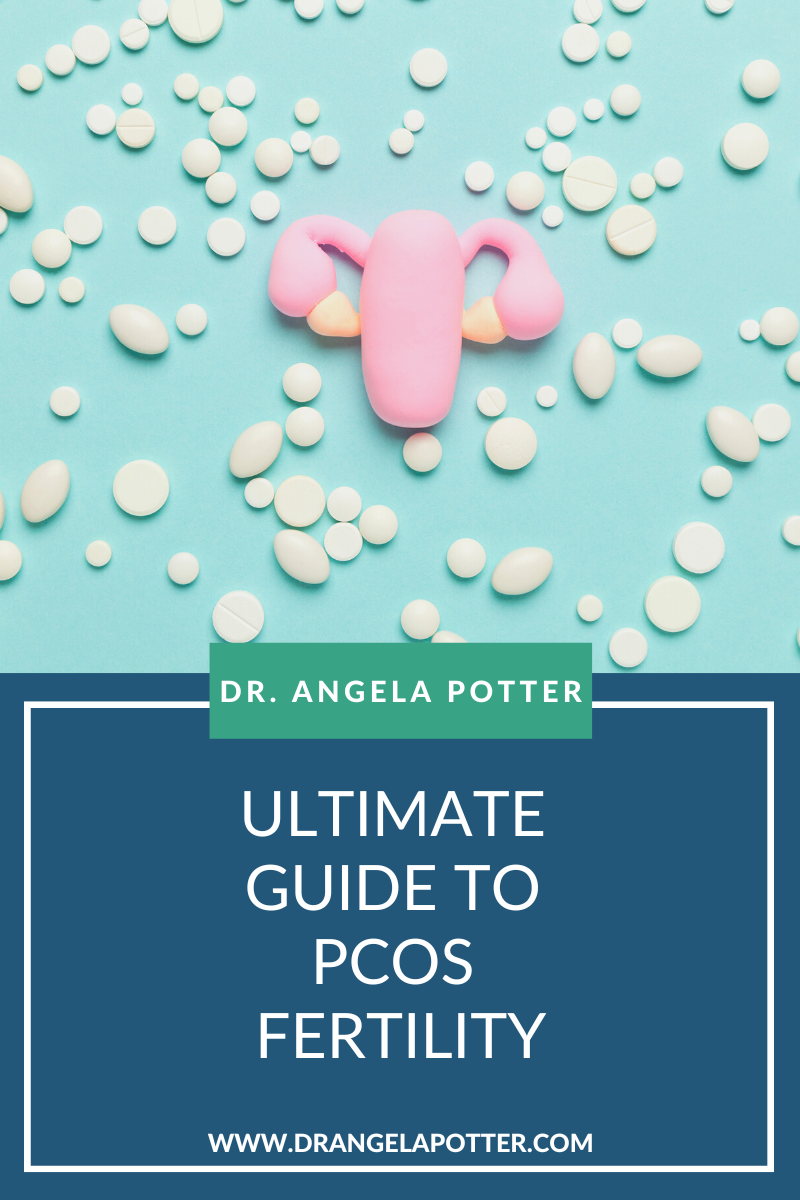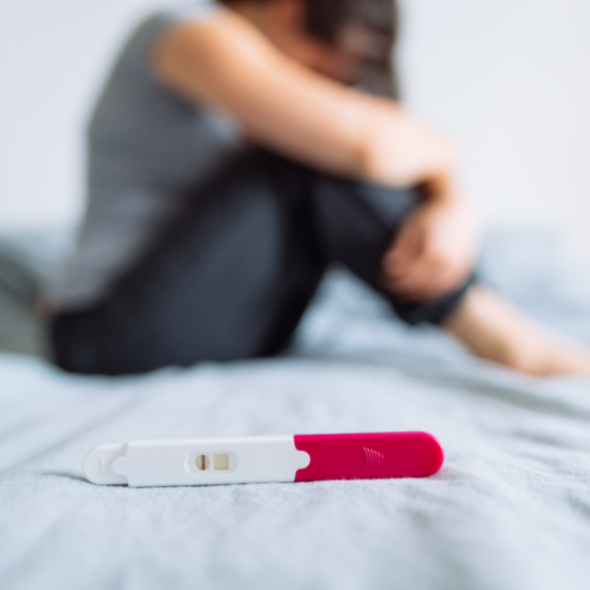Ultimate Guide to PCOS Fertility: What You Need To Know
PCOS fertility can feel like a needle in a haystack.
Here's what I mean.
Have you ever gone into your doctor and they say to you, “you have PCOS, here’s a pamphlet and a prescription, I’ll see you again in 6 months.”
Or maybe you’ve heard something like, “you’re obese, just lose weight and the PCOS will go away.”
Or how about, “you’re infertile, the only way to treat your PCOS is to get back on birth control.”
This kind of mis-information and un-informed care is out there.
PCOS is the most common cause of infertility and affects 5 to 6 million women so this un-informed care needs to turn around quickly.
That's why I’m glad you’re here.
This ultimate guide to PCOS fertility will help you get the answers you need to be confident and empowered with your fertility health.
It’s estimated that between 5 and 6 million people have PCOS, in the US alone. If you are feeling lost, you are not alone. This guide will get you clarity on where you are and where you need to be.
What is PCOS?
Polycystic Ovarian Syndrome (PCOS) is a condition that causes period problems, ovulation issues and hormonal imbalances.
These are some of the most common PCOS symptoms. Do any of them sound familiar to you?
—> Period problems
Period problems can include having irregular cycles, no cycles at all, issues with ovulation, or fertility problems.
—>Unwanted hair growth
Ever found yourself searching for laser hair removal salons near to you? You may have PCOS. You may find hair growing in places like the chin, back, lower belly and upper thighs.
—> Polycystic ovaries
Polycystic ovaries means there are 12 or more cysts on one ovary.
—>Metabolic issues
Insulin-resistance is a metabolic issue that is common in PCOS. It can lead to fertility struggles because it shuts down ovulation.
What causes PCOS?
It's unknown exactly what causes PCOS but here are some theories:
—> Genetics
Yes, that's right. Good ol'genetics. Researchers have found a connection between women who have PCOS and their kids. They have also found a connection between twins.
—> Increased LH
Luteinizing hormone (LH) is a baby-making hormone and it's often elevated in PCOS. Too much LH can actually shut down ovulation and bringing fertility down.
—>Undeveloped eggs
A variety of issues can lead to undeveloped eggs and poor egg quality. Imbalanced hormones, deficiencies in certain antioxidants and nutrients can all cause undeveloped eggs.
—> Issues with insulin
Roughly 70% of women with PCOS also have insulin resistance so it's common! The problem is, too much insulin in the body then leads to shutting down ovulation which you don't want.
PCOS Fertility Symptoms
These are some of the most common PCOS fertility symptoms to look out for.
Irregular periods
Long cycles
No positive ovulation on an ovulation test
Acne
Extra hair growth
Easy weight gain, especially around your middle
If you want to learn more about symptoms, head over to read my popular article, Do You Have One of These 5 Important PCOS Infertility Symptoms? What To Do About It Now.
Why does PCOS affect fertility so much?
The issue with PCOS is that too many eggs begin to grow and then stop growing too early which leads to all those cysts in the ovaries.
So if you have eggs that stop growing too early they can't break free to go make a baby because they haven't fully matured.
Other aspects of PCOS can affect fertility. Some of these include:
Insulin-resistance
Too much LH and FSH
Thyroid issues
Lots of stress
An imbalance of baby-making hormones like progesterone and estrogen
What is infertility?
The CDC defines infertility as not becoming pregnant after having unprotected sex for a year or more. For women who are 35 or older, infertility is defined as not becoming pregnant after trying for six months or more.
PCOS Fertility Diagnosis
Most providers rely on the Rotterdam Criteria for diagnosing PCOS. The Rotterdam criteria means you must fit into two out of three categories to be diagnosed with PCOS.
To be diagnosed with PCOS with the Rotterdam Criteria, you need to fit into two out of three of these criteria:
—> Oligo-and/or anovulation
What it means: you have ovulation issues or you’re not ovulating at all.
—> Clinical and/or biochemical signs of hyperandrogenism
What it means: you have too many androgen hormones (testosterone) flowing in your body. Or, you have symptoms like unwanted hair growth or acne that show you have too many of these androgen hormones.
—>Polycystic ovaries by ultrasound
What it means: you have multiple cysts (12 or more) on your ovaries.
The second part of a PCOS diagnosis is ruling out other conditions that may be causing your symptoms. Things like hypothyroidism which is one common condition that can look like PCOS.
PCOS Types
Did you know that there are four different types of PCOS? Determining your PCOS type (or types) is a pivotal part of PCOS fertility path and it's commonly overlooked.
Here's a brief look into each of they different types and how they might show up.
PCOS Type #1: Insulin-resistance
Basically, insulin-resistance means blood sugar issues. Blood sugar issues are going to show up around food. We might as well just say "hangry" here and we will all understand, am I right?
But seriously, insulin-resistance knocks around other important baby-making hormones so it's important to take care of. Particularly with PCOS because around 70% of women with PCOS have insulin-resistance.
We all know how it feels to be hangry, but here are some other common symptoms of insulin-resistance:
Shakey
Lightheaded
Irritable
Quick-tempered
Headaches
Blurry-vision
Easy weight gain
Insulin-resistance can affect fertility by:
Reducing how the ovaries respond to LH which then shuts down ovulation.
Changing the environment of your endometrium (your uterus) so that it is not ready to accept (implant) an egg.
Reducing blood flow which can affect hormones and implantation.
So now you're convinced at how important it is to balance blood sugar to help fertility, right?
PCOS Type #2: Post-Pill PCOS
Have you gotten off the pill (or hormonal birth control) and suddenly you feel like your body is different? Maybe you are gaining weight, you’re moody, tired and your periods still haven’t come back?
You are not alone and it’s not all in your head! Post-Pill PCOS may be a cause of these symptoms.
Post-pill PCOS happens after taking hormonal birth control.
Common symptoms of Post-Pill PCOS
Period hasn't started
Period has come back but is irregular or long cycles
Easy weight gain, particularly around your mid-section
Acne, particularly around the chin-line and at certain times during the month
Unwanted hair growth like on the chin, back, lower belly and upper thighs.
PCOS Type #3: Adrenal PCOS
Adrenal PCOS has to do with stress.
More specifically how your stress hormone, cortisol, is functioning throughout your body.
Now, if you are struggling with infertility you’re going to be stressed. Super upset and emotional. So it’s unhelpful to get the advice, “just get more sleep and lose your stress, everything will turn out just fine for you”.
Am I right??!!!
You certainly won’t hear that kind of advice from me!
This type of PCOS is about your hormonal response to stress. Are your stress hormones at normal levels and are they rising and falling at appropriate times?
Here's how too much cortisol lowers fertility:
Too much cortisol increases insulin, which shuts down ovulation.
It affects the thyroid, which affects those baby-making hormones like estrogen and progesterone.
Cortisol also reduces gut health, which can cause elevated estrogen and lowers ovulation.
You get the picture, right? Super important to have a plan that addresses adrenal issues with PCOS.
PCOS Type #4: Inflammatory PCOS
This type of PCOS is associated with other inflammatory conditions in the body. Other conditions like autoimmune diseases, digestive upset, or random aches and pains.
It's important to talk with a doctor about your own levels of inflammation so they can help you run specific tests or talk through what may be a cause of inflammation for your body.
Too much inflammation in the body can affect fertility by increasing insulin and lowering rates of implantation.
PCOS Fertility Testing
Testing is an important part of the fertility journey. It gives concrete information about what deficiencies and imbalances that could be causing your fertility struggles.
This list is a fairly comprehensive list of labs that should be evaluated for your PCOS, but this is also not a complete list.
Why?
Remember, everyone has a different health picture so the labs you need may be different from what your friend needs.
But in short?
This list will give you a really good starting off place.
Be sure to bookmark this page and come back to it as you need so you can have this information at your fingertips!
PCOS Fertility Labs
17-hydroxyprogesterone: This will tell you if you have the Non-classic Congenital Adrenal Hyperplasia.
AMH: Anti-mullerian hormone is helpful to understand ovarian reserve.
CBC: This test will find anemia.
CMP: Looks at your liver and kidney health.
DHEA-S: DHEA helps to build other hormones like estrogen and progesterone.
Estradiol: A form of estrogen which is typically tested on day 3 of the cycle (day 1 being the first day of bleeding). This test can be an indicator of poor egg quality or quantity.
Ferritin: Women with a higher iron count have been found to have better chances at becoming pregnant.
FSH: Follicle stimulating hormone is tested on day 3 of your cycle. It is a hormone made in your brain and helps with egg-growth and ovulation.
LH: Luteinizing hormone, tested on day 3 of your cycle, is a hormone also made in your brain and it helps release the egg for ovulation.
Progesterone: Tested on day 19, 20, or 21 of your cycle. This will show if you ovulated.
Prolactin: Too much prolactin will shut down FSH.
Salivary Cortisol: This test looks at the stress hormone cortisol levels throughout the day.
SHBG: Helps regulate androgen hormones
Testosterone: Testosterone contributes to symptoms like acne, unwanted hair growth and ovulation issues.
Thyroid Panel: I recommend TSH, free T3, free T4, and thyroid antibodies as a comprehensive thyroid panel.
Vitamin D: Research has found that the more optimal the vitamin D status, the more live-birth rates and more positive pregnancy tests.
PCOS Fertility Treatment
I am going to cover the medications and supplements that are most frequently used. Thankfully, there are a lot of different treatment options for PCOS fertility. This is why I will cover the ones that are most commonly used.
PCOS Fertility Treatment Part 1: Medications
Medications can be powerful PCOS fertility tools. These are the three medications that are used most often for PCOS.
Letrozole: Letrozole is an ovulation induction medication like Clomid.
Clomiphene citrate (clomid): Clomid is one of the ovulation induction medications like Letrozole.
Metformin: Metformin is a blood sugar balancing medication so it helps to lower those sugar levels. It can help with ovulation. Curious about the connection between metformin and PCOS? Current recommendations may surprise you. Find them here.
PCOS Fertility Treatment Part 2: Supplements
In my expert opinion, supplements are an important part of a PCOS fertility journey because they help overcome common imbalances.
Take vitamin D for instance. Low vitamin D has been found to be connected to lowered fertility. If you get tested and it shows you too are deficient, then a vitamin D supplement would be right for you.
These supplements for PCOS fertility are just a starting place. Remember, the best fertility starts with an individualized plan that addresses the specific PCOS issues that are keeping you from getting pregnant.
Talking with a PCOS specialist is the first step in getting the right supplements for your fertility health so you can get the results you are looking for.
To learn even more about PCOS fertility supplements, watch my video below and head over here to read my article all about the top 5 best supplements for PCOS fertility.
PCOS Fertility Treatment Part 3: Food
Nutrition can provide a lot of benefits for fertility with PCOS. While supporting your fertility with PCOS, here some important considerations for your food plan include:
—> Reducing insulin-resistance and balancing blood sugar
You are now familiar with how important it is to balance blood sugar and keep insulin levels optimized for your fertility. One of the best ways to do this is through food.
—> Eating for weight loss in a way that is sustainable and supportive to your long-term health.
If weight loss is a part of your PCOS fertility picture, working with an approach that supports weight loss in a sustainable way is key.
The shortfall of many common diets is that they are focused on short-term results and they include restrictive ways of eating. When you’re trying to get pregnant you need a plan that will not only give you the results you want, but also help you optimize your health for fertility along the way.
—>Focusing on increasing fertility-specific nutrients in your diet
Regardless of if you are trying to lose weight, getting fertility-supportive nutrients in your body is key and a great way to support your fertility health.
Curious about specific foods that can help improve PCOS fertility? Head on to read my article here about five of those fertility-specific foods.
PCOS Fertility Treatment Part 4: Other treatments
PCOS responds well to a variety of treatments so consider adding one of these into your fertility plan:
Acupuncture
Abdominal massage
Chiropractic care
Now that you've got the basics, here is the next set of information you need in order to boost your chances of getting pregnant:
--> Do you want to get pregnant with PCOS quickly? Check out the three truths you need to know here.
--> Want to find the best prenatal vitamin for PCOS? Head over here to get my guide on how to choose the best one.
--> How do you improve your chances of getting pregnant with PCOS? I'll tell you right here.
--> If you're struggling to get pregnant with PCOS, these are 3 key fertility steps to have in place now! Learn about them here.
--> Wondering what the difference is between metformin and myo-inositol? Which is better? What to take? Find out in my post here.
PCOS fertility can be hard to navigate but with this PCOS fertility guide, you have the blueprint to optimize your fertility health.
Do you feel like your body is broken and are you crying yourself to sleep at night?
Your next step is to book a FREE I Want My Body To Work Right! PCOS Breakthrough Session
Sign up here today and have the peace of mind that you are moments away from getting clear, step-by-step guidance to help open up your fertility.
Extra references used in this PCOS fertility article
https://www.uptodate.com/contents/clinical-manifestations-of-polycystic-ovary-syndrome-in-adults
https://www.uptodate.com/contents/metformin-for-treatment-of-the-polycystic-ovary-syndrome
https://www.uptodate.com/contents/epidemiology-phenotype-and-genetics-of-the-polycystic-ovary-syndrome-in-adults
https://www.uptodate.com/contents/ovulation-induction-with-letrozole
https://www.uptodate.com/contents/ovulation-induction-with-clomiphene-citrate
https://www.uptodate.com/contents/diagnosis-of-polycystic-ovary-syndrome-in-adults
https://www.uptodate.com/contents/overview-of-ovulation-induction


